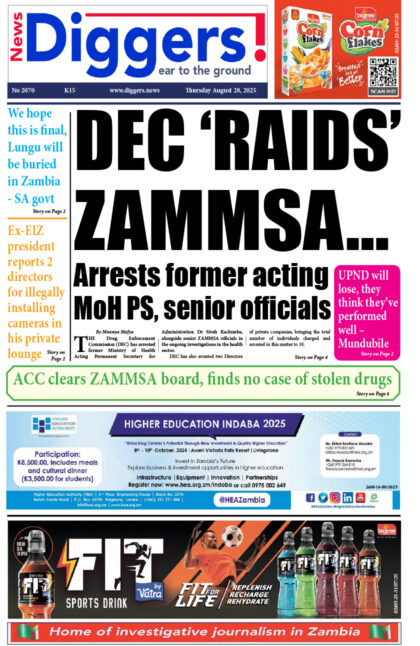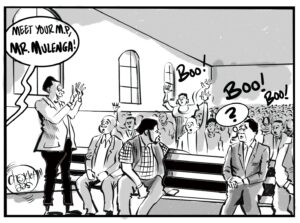ECONOMIST Professor Oliver Saasa says the the cost of living becomes a problem when the people are not getting an income which can sustain them.
And Prof Saasa says the Russia, Ukraine war is proof that when you squeeze a significant global player, you end up hurting the world economy.
Speaking when he was featured on ZNBC’s Sunday interview programme, Prof Saasa said the cost of living in the country was perceived to be high because of low income levels.
“You cannot actually play around if you are not growing the economy by reducing the cost of living. The surest way, medium to long term way of reducing the cost of living is to be more productive. Let’s get out of the offices and let’s remove our ties, let’s start being productive. It is not high actually (cost of living). What is the problem is that you have low income. The cost of living becomes problematic when you are not empowering and equipping the people to be able to get an income, a waging income that can sustain them,” Prof Saasa said.
“Most employees, including in government, presently their take-home pay is so little, their take-home pay cannot take them home. We call them employed poor. You are working but you are not earning sufficiently to be able to meet your requirements but you are tied down to a job, to an employer for 30 days and some of the employers will not allow you to do anything else.”
Prof Saasa said the effects of the increase in fuel pump prices would have a negative impact on the economic recovery plan the country had embarked on.
“It does and it will affect the economic recovery programme. There is some hope though, you have seen some movements in terms of inflation. Inflation has come down from 14.2 percent in February, I think [now] it’s 13.3. The target range of the central bank in the last two years or so is 6-8 percent and we are slowly getting there. So, that has a certain element of cushioning effects but it is not sufficient especially when the prices of very important input in production, just like electricity, is affected. Those are the really cost-push triggers that we must manage but you can only manage by way of subsidy. If we have to go that route, if it is possible, the management itself has to be aligned to the capacity of the treasury to sustain those levels. Unfortunately and this is the hard reality, government does not have those resources to subsidise much as this is the best time to do it,” he said.
Prof Saasa expressed hope in the UPND leadership, saying if they were to disappoint the country, then it was not now.
“Definitely if you ask me, sorry to sound political now, I see so much hope. I was blaming somebody, I had put on weight like 3 kg and I tried to shed it, and I am failing. I just realised I sleep more peacefully these days. Everything is relative, I believe that there is much more hope now with the team that is in place. If they will disappoint us I think not now. Definitely, what we had before for people who understood what was required to do to run an economy even to manage our own politics, that was not really in the best interest of Zambians and I am glad we had a change of government,” he said.
And Prof Saasa said the war in Ukraine had triggered price escalations.
“While we are as a nation very concerned and worried about what is happening, we have to put things in context. I appreciate that this is not a challenge that was anticipated not only by the Zambian government but by the global community. This is being driven by one factor and I think it is common knowledge to everybody that the war in Ukraine has sent shivers down the spine of the average economy. At the moment, the prices now have escalated to levels almost twice from about two months ago. Essentially what we are saying is that until and unless there is positivity at the level of discussions between the warring parties and reaching some amicable solutions to some of the problems, you are anticipating to seeing this. When you are squeezing a significant global player, you are likely not only to hurt them but to hurt the global economy and that is really what we are seeing,” he said.
Prof Saasa said as Zambia celebrates increased copper prices, it must also increase its production.
“You cannot celebrate a good price on the global market if you are not feeding into the global market with sufficient production to the world. You can only celebrate if you are taking advantage of that good price. Essentially meaning we must expand production. We have missed the train, especially in terms of numbers. The new government is saying we want 3 million metric tons, we are below 900,000 metric tons at the moment per annum, we shouldn’t be here. We were several years ago for a very long time number one copper producer in Africa. Congo took over several years ago because we are not doing the right thing in terms of supporting the mining sector development, especially in terms of expansion,” he said.
Prof Saasa said the Ministry of Mines needed to be strengthened in order to ably discharge its responsibilities.
“Most of the time you look at the mining sector as a homogeneous group, they are all the same. When we say mining, we don’t disaggregate them and yet we also know there are good guys in the mining sector and definitely, there are bad guys that have never and will always show that they haven’t made a profit. There are so many crooks including ourselves Zambians. I mean how many Zambians are invading tax? The important two things government has to do especially with the mining sector is to ensure that rogue companies are not allowed to hang around here. They must be reporting, you must be able to ensure that they are reporting how much they have produced,” he said.
“Secondly, monetary. Sometimes you will hear people saying the mines are stealing and you ask somebody ‘you think they are stealing how much are they stealing’ and they say ‘I don’t know but I think they are stealing’. That’s not good enough. Even in court you cannot just accuse somebody, you have to prove. You have to strengthen the capacity of the ministries and in particular the Ministry of Mines to be able to discharge its responsibilities more ably to ensure that the right things are done in the mining houses.”
Meanwhile, Prof Saasa said Zambia had a lot of potential and yet its people were still poor.
“Zambia is one country where if you talk about potential, with a lot of it, but again like the other day the President was saying who eats potential. We must be able to tap the resources that we have because this country is a very rich country with poor people in it. That is a bad contradiction. So once you start growing the economy you may discover that you have even the capacity to subsidise not only in terms of fuel but also social service provision to the people,” said Prof Saasa.























